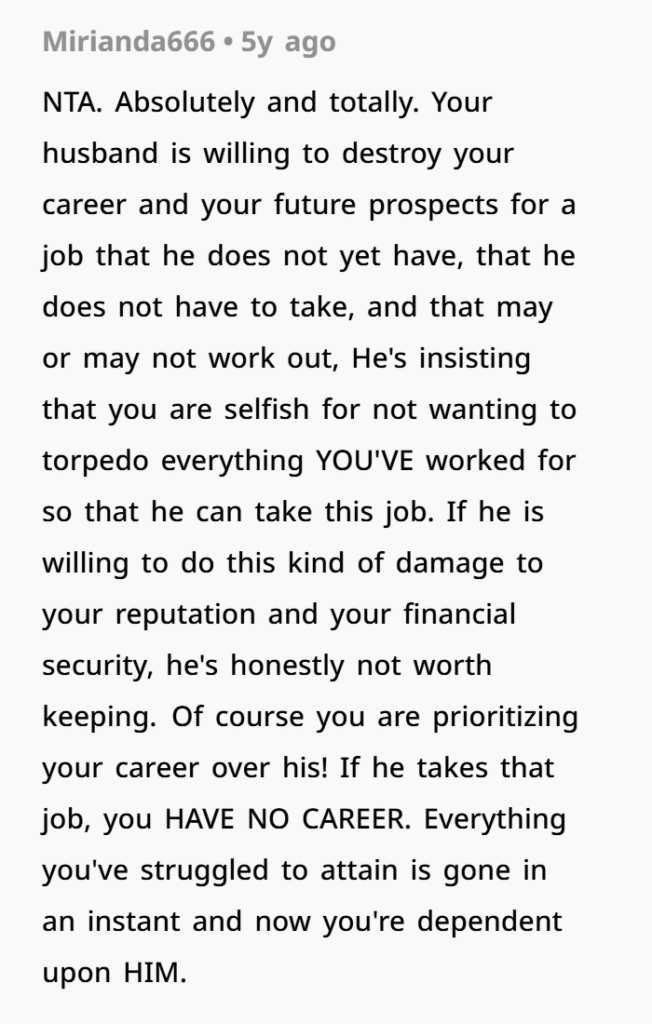Career vs. Love: AITA for Asking My Husband to Turn Down His Dream Job to Save My Career?

In this AITA post, a woman (33F) finds herself in a difficult situation where her husband (36M) has received an offer for his “dream job” at a competitor company, but accepting the role would jeopardize her own career. She is the breadwinner, making over $200K with the potential to earn significantly more, while her husband’s job offer pays $65K, which wouldn’t be enough to support their family. The crux of the issue is that her company is in direct competition with her husband’s potential employer, and her job stability would be at serious risk if he were to work there. She asks her husband to turn down the offer for the sake of their future, even though it’s his dream job. The situation escalates when he goes behind her back and accepts the offer, leading to a dramatic confrontation where she demands that he either declines the offer or leaves the marriage. She now feels betrayed, but also believes she made the only choice to protect her livelihood.
When external factors begin impacting a marriage, it’s important to figure out whether your spouse is more important than what’s being argued about

Advertisement – Continue Reading Below
The poster shared that she was the breadwinner of the household and that she was earning over $200k working in a very niche industry

Advertisement – Continue Reading Below

Advertisement – Continue Reading Below

Advertisement – Continue Reading Below

Advertisement – Continue Reading Below

Advertisement – Continue Reading Below

Advertisement – Continue Reading Below

Advertisement – Continue Reading Below

Advertisement – Continue Reading Below

Advertisement – Continue Reading Below

Advertisement – Continue Reading Below

Advertisement – Continue Reading Below

Advertisement – Continue Reading Below
This post raises significant ethical, emotional, and financial dilemmas related to career sacrifice, personal priorities, and the dynamics of power in a marriage. While at first glance, the issue may seem centered around the financial disparity between the couple, it also deeply involves trust, sacrifice, and the tension between personal goals and mutual responsibilities.
Advertisement – Continue Reading Below
Career Sacrifice vs. Support: The Strain of Financial Imbalance
The most obvious conflict in this situation is the career sacrifice that the woman is asking her husband to make in order to preserve her job stability. The husband’s job offer is undeniably attractive and aligned with his professional dreams, yet accepting it directly threatens her livelihood. In some relationships, career dreams are seen as something to support and celebrate; however, when those dreams conflict with practical necessities, the balance becomes precarious. From the wife’s perspective, she is prioritizing the stability of the family and her own career, which is essential not only for their lifestyle but for her future prospects in a highly specialized and competitive field.

Advertisement – Continue Reading Below
While many would argue that support in a marriage should be mutual, the financial reality of their situation complicates this ideal. The wife is the higher earner, with significant career prospects, whereas the husband’s role would place them in a vulnerable position financially. In a scenario like this, it’s not just about one career thriving at the expense of the other; it’s about the preservation of the family’s well-being in a difficult financial landscape.
Psychologists and relationship experts often discuss how unequal financial contributions in a marriage can lead to significant emotional strain. The dynamics of being the primary breadwinner often come with pressure, and in this case, the wife’s role seems to have given her a sense of control over the financial stability of the household. This sense of control can blur the lines between marital support and professional boundaries. As Dr. Laura Berman, a renowned relationship therapist, points out, this imbalance can sometimes lead to feelings of resentment, especially when one partner feels the weight of financial decisions that affect both careers.
Betrayal and Trust in Marriage
The wife’s sense of betrayal comes from not only her husband’s decision to move forward with the job offer behind her back but also from the violation of her trust in the face of a clear ultimatum. Trust is an essential pillar in any marriage, and when one partner takes a significant professional step that directly threatens the other’s career, it creates a breach of trust that’s difficult to repair. In this case, the wife is attempting to protect herself and her professional future, which in turn affects their mutual financial future, yet her husband’s actions make her feel unsupported and undervalued.
The emotional hurt is compounded by the fact that the wife had already presented an alternative plan: the husband could return to school or pursue another career path without undermining the family’s financial stability. The husband’s refusal to consider these alternatives and his decision to go behind her back exacerbates the emotional weight of the situation. The betrayal cuts deeper because the wife feels that not only is she losing her career, but she’s also losing the partnership and respect she thought she had.

Advertisement – Continue Reading Below
Balancing Career and Marriage: A Real-Life Ethical Dilemma
This situation is emblematic of real-life challenges many couples face when their professional goals and personal relationships collide. Career choices can be a deeply personal and emotional decision, but they also carry consequences that affect the entire family unit. There are few situations in marriage where one partner’s career decisions might have such a direct impact on the other’s livelihood, and this scenario highlights just how complicated it can be to navigate these decisions when both partners’ futures are on the line.
Advertisement – Continue Reading Below
The wife’s ultimatum may seem extreme to some, but for her, it might feel like a necessary action to protect the financial foundation that supports both of their lives. The couple’s situation is a real-world manifestation of the balance that many couples try to achieve: how to support each other’s dreams while also managing the financial and professional realities of life.
The Question of Selfishness and Sacrifice
While the husband accuses the wife of being “selfish” for prioritizing money, it’s important to recognize that this isn’t solely about finances but about the long-term ramifications for both partners. Financial sacrifices in a marriage are expected, but the question arises as to whether one partner’s career dreams should outweigh the other’s professional security. This is where the lines between selfishness and self-preservation blur. In many relationships, both partners might be willing to make sacrifices for each other, but this situation challenges the balance of sacrifice. The wife is asking her husband to sacrifice his dream job, while she continues to pursue her own career, but she’s also asking him to consider the collective well-being of their family, which is a reasonable request given the stakes.
The Role of Communication in Difficult Decisions
The escalation of this issue—her husband’s decision to go behind her back and accept the job offer—highlights a breakdown in communication. This is a situation that demands open and honest dialogue, but instead, it’s become a battle of egos and priorities. The wife’s choice to inform her company of the potential conflict was a proactive move to protect her career, but it also pushed the situation into a public and irreversible realm. By informing her company, she closed off the possibility of negotiation, making the ultimatum all the more final.
In situations like these, relationships often hinge on how partners handle difficult, high-stakes decisions. In this case, both parties were unable to compromise, leading to a complete rupture. The wife’s decision, though harsh, may have been the only way she saw to protect herself and her career in the face of a seemingly impossible conflict.
Most folks sided with the woman, but they felt that she and her husband should have discussed such possibilities much earlier

Advertisement – Continue Reading Below

Advertisement – Continue Reading Below

Advertisement – Continue Reading Below

Advertisement – Continue Reading Below

Advertisement – Continue Reading Below
This situation is complex, involving not only financial decisions but deep emotional and relational consequences. The wife’s request that her husband turn down his dream job to protect her career stability is understandable given the stakes, but the emotional fallout, including feelings of betrayal and a lack of support, shows just how difficult balancing personal dreams with family obligations can be. While the husband’s desire to pursue his dream is valid, the wife’s stance also reflects a reasonable need to protect her career, especially when the consequences for her are so severe. It’s clear that this decision has fractured their relationship, and it remains to be seen whether they can recover from the emotional rift caused by the differing career priorities.
Advertisement – Continue Reading Below






